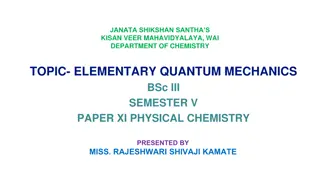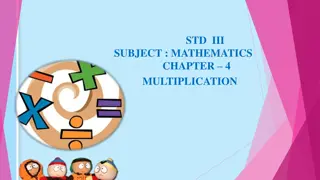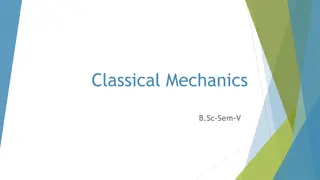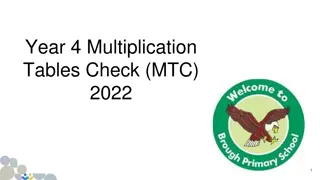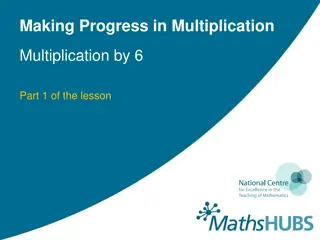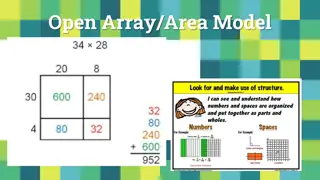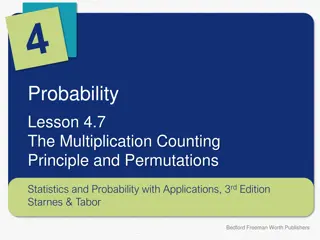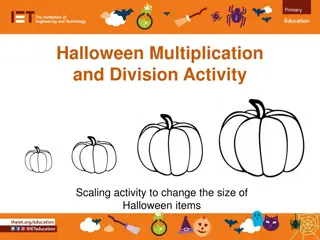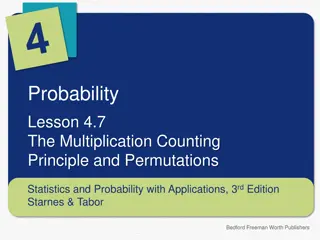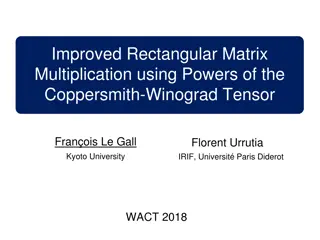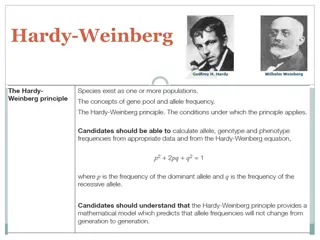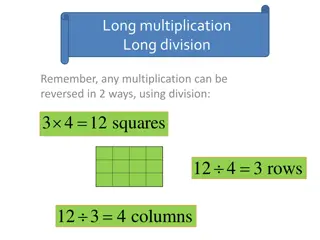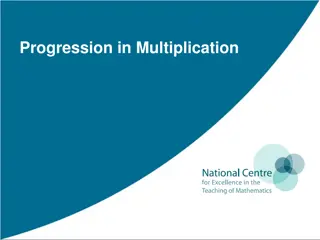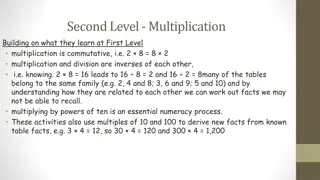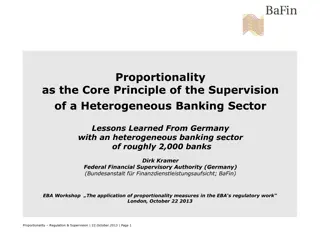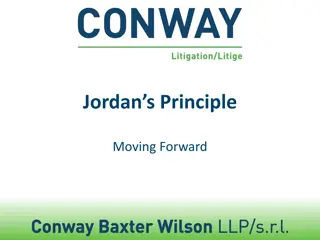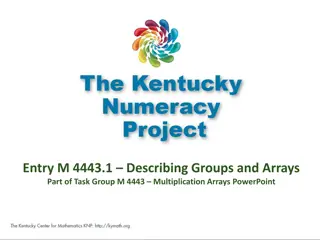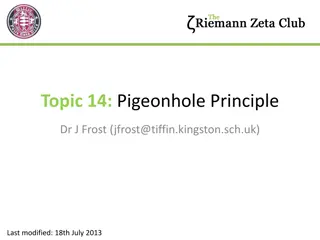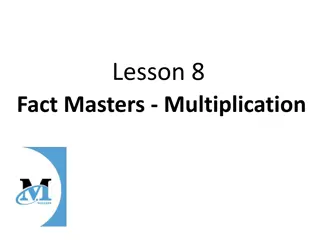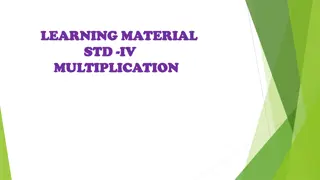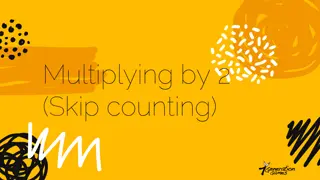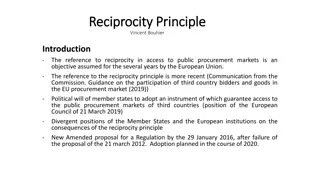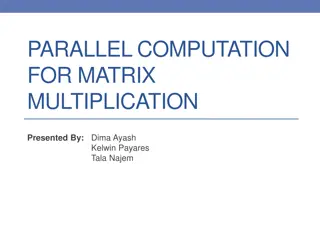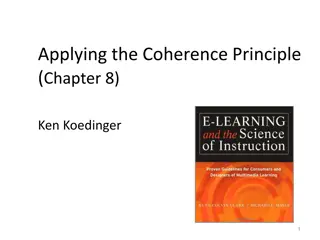E3 Playbook: Discipleship Multiplication in Action
Explore the E3 Playbook, a strategic guide based on Matthew 28:18-20, designed to empower individuals in personal transformation and public multiplication as disciples of Jesus. Learn how to engage, equip, and empower through biblical principles and practical tools, fulfilling the clear command to m
0 views • 24 slides
Heisenberg's Uncertainty Principle in Elementary Quantum Mechanics
Heisenberg's Uncertainty Principle, proposed by German scientist Werner Heisenberg in 1927, states the impossibility of simultaneously and accurately determining the position and momentum of microscopic particles like electrons. This principle challenges classical concepts of definite position and m
0 views • 49 slides
Counting Principles and Pigeonhole Principle Explained
Explore the concepts of counting principles and the pigeonhole principle through practical examples and tips. Learn how to apply these principles to solve problems effectively. From understanding basic counting rules to the advanced pigeonhole principle, this content provides insights and guidance o
2 views • 35 slides
Mastering Multiplication: Enhancing Mathematical Skills in Kids
This educational material focuses on teaching multiplication concepts to students, covering topics such as repeated addition, multiplication of various digit numbers, properties of multiplication, and real-life applications. Interactive methods and self-made resources are employed to help students u
0 views • 36 slides
Understanding Classical Mechanics: Variational Principle and Applications
Classical Mechanics explores the Variational Principle in the calculus of variations, offering a method to determine maximum values of quantities dependent on functions. This principle, rooted in the wave function, aids in finding parameter values such as expectation values independently of the coor
1 views • 16 slides
Year 4 Multiplication Tables Check (MTC) 2022 Information
The Year 4 Multiplication Tables Check (MTC) in 2022 assesses children's fluency in recalling multiplication tables. It helps schools identify students needing additional support. The check will occur between June 6th and June 24th, 2022. It is digital and children have 6 seconds to answer each ques
0 views • 9 slides
Importance of Times Tables and the Multiplication Tables Check for Children
Times tables play a crucial role in supporting children's mathematical foundation, essential for their future academic success. Understanding the significance of multiplication facts up to 12x12 is emphasized, aiding proficiency in later years. The Multiplication Tables Check, conducted digitally, e
1 views • 18 slides
Engaging Activities in Multiplication Learning
Explore engaging activities to enhance multiplication skills. Children develop fluency in counting by sixes, express multiplication sentences clearly, and understand multiplication as repeated addition. They learn to chant the six times table, identify patterns, and notice relationships within the m
0 views • 11 slides
Understanding Le Chatelier's Principle in Chemical Equilibrium
Le Chatelier's Principle states that when a system at equilibrium is disturbed by changes in concentration, temperature, or pressure, the equilibrium shifts to counteract the change. This principle can be applied to predict the direction of equilibrium when changes occur. Changes in concentration, p
0 views • 10 slides
Supporting Your Child with Multiplication Tables Check
Understand the Multiplication Tables Check for primary school children, its importance, what it entails, and how you can assist your child. Learn about the online assessment, expectations, preparation at school, and ways to support your child in mastering multiplication tables effectively.
0 views • 10 slides
Mastering Two-Digit by Two-Digit Multiplication with Area Models
Discover how to solve multiplication equations by breaking numbers based on place value using open array area models. Learn the step-by-step process of decomposing numbers to simplify multiplication problems, illustrated through visual examples. Enhance your understanding of multiplying two-digit nu
2 views • 11 slides
Understanding the Multiplication Counting Principle in Probability
The Multiplication Counting Principle and Permutations play a crucial role in determining the number of possible outcomes in various processes. This lesson covers how to use factorials to count permutations, compute arrangements of individuals, and apply the multiplication counting principle to dete
0 views • 14 slides
Advanced Techniques for Multiplication Performance Improvement
Explore advanced methods to enhance multiplication performance by utilizing shifts and add/subtract operations instead of traditional arithmetic. The solutions provided involve hexadecimal number pairs, demonstrating the best ways to calculate products efficiently. Furthermore, a challenge is presen
2 views • 59 slides
Understanding Jordan's Principle and Its Impact on First Nations and Inuit Children in Canada
Jordan's Principle was named in memory of Jordan River Anderson, a young boy whose tragic story led to the establishment of a legal requirement ensuring access to services for First Nations and Inuit children in Canada without delays or disruptions. This principle aims to prevent situations where ch
1 views • 9 slides
Optimizing Multi-Scalar Multiplication Techniques
Delve into the world of optimizing multi-scalar multiplication techniques with a focus on improving performance, especially in Zero Knowledge Proofs systems using elliptic curves. Explore algorithmic optimizations like the Bucket Method by Gus Gutowski and learn about the runtime breakdown, motivati
3 views • 52 slides
Exploring Multiplication Stories with Key Words
Engage in a lesson on writing multiplication stories using key words related to multiplication. Practice with warm-up exercises, identify key words, create real-life scenarios, and solve various multiplication problems creatively. Enhance your understanding of multiplication operations through pract
0 views • 9 slides
Analysis of Electron Multiplication in Avalanche Gain Process
This report analyzes the phenomenon of electron multiplication in the avalanche gain process, specifically focusing on the gains and transparencies at different stages within the system. The study involves Gem foils and Polya distributions to understand the effective gains and transparency percentag
0 views • 6 slides
Understanding Fluids, States of Matter, and Phase Changes
Exploring key concepts in physics including Bernoulli's Principle, viscosity, cohesion, states of matter (solid, liquid, gas, plasma), phase changes (evaporation, condensation, etc.), density, pressure, and more. Discover the properties and behaviors of fluids in relation to gases and liquids, along
1 views • 54 slides
Understanding the Acceleration of the Universe and the Equivalence Principle Violation in the Horndeski Vector-Tensor Theory
Exploring the implications of the Equivalence Principle Violation after reheating in the context of the accelerated expansion of the universe. The study delves into the Horndeski vector-tensor theory, gravitational waves, and the impact of modified gravity and dark energy. Insights are provided on t
2 views • 20 slides
Halloween Multiplication and Division Activity: Scaling Halloween Items
Engage in a fun Halloween multiplication and division activity where you scale up a pumpkin and scale down a ghost using grids. Understand the concept of doubling and halving sizes of Halloween items through visual representations. Practice multiplication and division skills in a festive setting.
0 views • 5 slides
The Multiplication Counting Principle in Probability: Exploring Permutations
Exploring the multiplication counting principle in probability, this lesson delves into determining the number of ways to complete a process involving multiple steps. Using factorials for permutations, the content showcases how to compute permutations of individuals taken at a time. Through examples
0 views • 20 slides
Improved Rectangular Matrix Multiplication Using Coppersmith-Winograd Tensor
In this research, the complexity of rectangular matrix multiplication is enhanced by analyzing the fourth power of the Coppersmith-Winograd tensor. By extending the understanding of the tensor's power, significant advancements have been made in the efficiency of non-square matrix multiplication, sur
0 views • 25 slides
Understanding Hardy-Weinberg Principle and Genetic Frequencies
Gene pool and allele frequencies play a crucial role in the Hardy-Weinberg Principle, a mathematical model predicting allele frequencies over generations. The principle outlines conditions like a large population, absence of mutations, random mating, and more. Equations such as p² + 2pq + q² = 1 h
0 views • 44 slides
Illustrated Methods of Multiplication and Division
The content explains various methods of multiplication and division, including long multiplication, lattice method, and short division, with detailed examples and visual aids. It covers concepts like reversing multiplication through division, using single-digit multiples, and step-by-step division t
1 views • 16 slides
Exploring Multiplication Concepts in Key Stage 1
Explore various aspects of teaching multiplication in Key Stage 1, including multiple representations, developing fluency, conceptual understanding, integrating fluency with understanding, and practical applications like grid multiplication and arrays. See how educators support children in mastering
0 views • 17 slides
Exploring Advanced Multiplication Concepts Through Arrays and Partitioning
Delve into the intricacies of multiplication through hands-on activities using arrays, partitioning, and understanding the commutative property. Discover how arrays can help visualize multiplication, learn to partition numbers for easier calculations, and grasp the concept of multiplying by powers o
0 views • 17 slides
Principle of Majority Rule in Company Law
The principle of majority rule is a fundamental aspect of company law, where the powers of control over a company rest with the general meeting representing the majority shareholders. This principle emphasizes that decisions are made by a simple or special majority vote, except for powers vested in
0 views • 9 slides
Proportionality as Core Principle in Supervising Heterogeneous Banking Sectors: Lessons from Germany
The supervision of a diverse banking sector, such as Germany's with roughly 2,000 banks, is based on the core principle of proportionality. This approach involves tailoring regulations and oversight to fit the individual characteristics of each institution, focusing on qualitative aspects, organizat
0 views • 8 slides
Jordan's Principle: Advocating for First Nations Children's Rights
Jordan's Principle is a vital advocacy tool aimed at ensuring equitable access to necessary services for First Nations children, emphasizing prompt resolution of jurisdictional disputes. Originating from the story of Jordan River Anderson, its implementation has faced challenges and legal battles. C
0 views • 21 slides
Year 4 Multiplication Check Information
By the end of Year 4, children are expected to recall multiplication facts up to 12x12 and related division facts. A statutory Multiplication Check will be introduced in June 2020, akin to the Year 1 Phonics Screening Check. The online check, lasting less than 5 minutes per child, comprises 25 quest
1 views • 10 slides
Understanding Group Structures and Arrays in Multiplication
Explore the foundational concepts of grouping and arrays in multiplication through activities designed to help students describe quantities arranged in equal groups or arrays. Teacher directions, examples for modeling arrays, and additional activity prompts are provided to support students in interp
0 views • 56 slides
Fun Times Table Bingo Game for Learning Multiplication
Enjoy playing a fun and educational Times Table Bingo game where you can test your multiplication skills. Your teacher will read out multiplication questions, and you have to find the answers on your card to win by shouting BINGO! The provided images display multiplication problems and solutions for
0 views • 14 slides
Understanding the Pigeonhole Principle in Mathematics
The Pigeonhole Principle, demonstrated through examples and explanations by Dr. J. Frost, illustrates the concept that if you have more "pigeons" than "holes," then at least one "hole" must contain multiple "pigeons." This fundamental principle is essential in solving various mathematical problems i
0 views • 27 slides
Mastering Multiplication Facts in Lesson 8
Improve multiplication skills from 0-9 through engaging activities such as modeling with manipulatives and practicing techniques. Explore essential questions and solve problems to enhance understanding of multiplication concepts.
0 views • 39 slides
Mastering Multiplication: Essential Concepts and Problem-Solving
Explore the fundamentals of multiplication, including multiplying 3-digit and 4-digit numbers, understanding properties of multiplication, and solving word problems. Learn the concepts of multiplicand, multiplier, and product, and enhance your skills through practical examples and exercises.
0 views • 31 slides
Introduction to Multiplication by 2 and Skip Counting Activities
Explore a fun learning journey of multiplying by 2, skip counting by 2, and filling in multiplication tables for the number 2. Engage in interactive tasks like solving number sentences, drawing for skip counting, and practicing multiplication facts. Enhance mathematical skills with visual aids and p
0 views • 10 slides
Understanding the Reciprocity Principle in Public Procurement Markets
The concept of reciprocity in access to public procurement markets, particularly in the European Union, has gained prominence in recent years. This principle involves mutual opening obligations for public procurement markets while considering concessions and exceptions, such as excluding defense and
0 views • 4 slides
Parallel Computation for Matrix Multiplication
Matrix multiplication is a fundamental operation with diverse applications across scientific research. Parallel computation for matrix multiplication involves distributing the computational workload over multiple processors, improving efficiency. Different algorithms have been developed for multiply
0 views • 36 slides
Writing Lab: Principal vs. Principle
Learn the differences between "principal" and "principle" with this informative Writing Lab mini-lesson. Understand their varied meanings as nouns and adjectives, and how they are used in different contexts. Enhance your diction skills and avoid common usage errors. Enjoy learning about the principa
0 views • 4 slides
Enhancing Student Learning Through Coherence Principle
The Coherence Principle emphasizes the importance of excluding extraneous, entertaining materials to improve student learning. Including such materials can compete for cognitive resources and divert attention from essential information. Utilizing simpler visuals and avoiding websites that violate th
0 views • 7 slides

